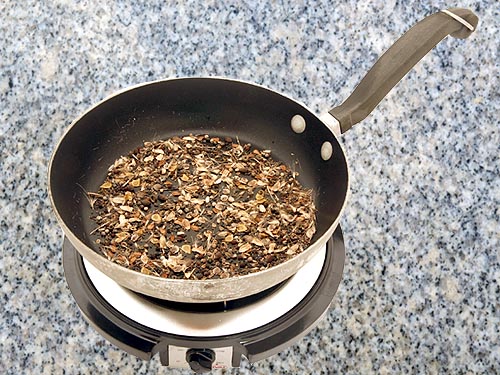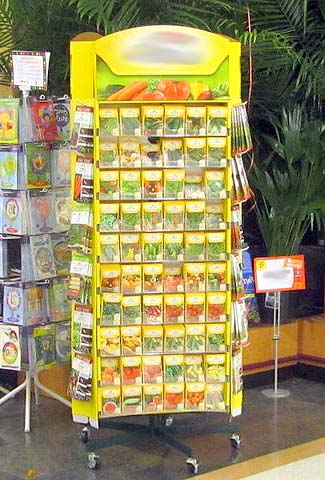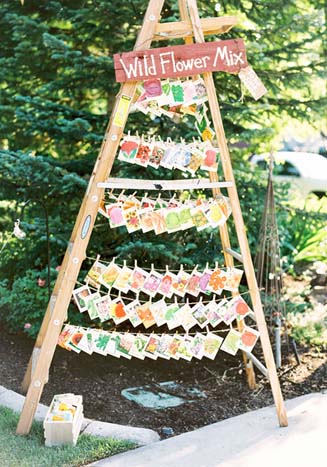
Are your seeds fried before you get them?
Do you know where your packet of seeds has been? Do you know how they have been treated before you buy them? Are you sure they were treated well so that they will be as viable as they possibly can be when you plant them? If you cant answer these questions then perhaps its not your fault that your seeds did not germinate. It could well be that your seeds were dead when you got them.
I am sure that at one time or another you have bought a packet of seeds, planted them, waited and nothing has happened. For many, they consider that they did something wrong, and sometimes you do. Some seeds are finicky about their growing conditions and wont grow unless the conditions are exactly right for them. This is why its important to always follow the growing instructions for seeds to have success. Unfortunately not all seed companies provide instructions for difficult seeds or they do and you don't read them. Always remember that even the professionals don't get all their seeds to germinate either. However no seed will germinate if its not been treated well before it gets to you.
Most seeds are fairly tough. They have a protective coating that helps to keep them moist inside and guard them from the rigors of the world. Most have to endure winters outside and hope they have fallen a an area that is favorable for them to grow the following year. However tough does not mean invulnerable. Treating seeds with care and storing them in the best way to keep them viable for the greatest length of time will help ensure that they will grow into healthy plants. Indeed that they will grow at all.
 Seed rack in store. In bright light, next
to card racks and backed by plants. Humidity will be high near the
plants and bright light and heat is not ideal for seed viability.
Seed rack in store. In bright light, next
to card racks and backed by plants. Humidity will be high near the
plants and bright light and heat is not ideal for seed viability.How long has it been on that rack?
If you are fast you might be able to get to the seeds when they first
arrive on the rack. Then they wont have been out in the warm store for
that long. However most people come to get their seeds long after they
have been sitting on that rack. How long have they been there, weeks?
Months? All that time in a warm store.
Where is the rack located?
Good stores will put them far inside the store where the temperatures
are fairly even, but I have seen many stores put them in windows where
the sun beats down on them during the day heating up the seeds. Is that seed going to be viable when you do plant it? Unless it's very tough, probably not.
How did your seed packet get to the rack in the first place?
Most likely it came in a truck. Packed in a box. That might be fine
but it depends on where that truck has been. Has it been moving through
sunny hot climates before it got to your store? Its possible that box
could have been left on the loading dock in the sun for hours, maybe
longer getting hotter and hotter. Seeds don't like that.
How was the seed processed and stored to begin with?
A large proportion of seed companies don't store their seeds in cold
conditions. Having been to many different seed conferences and talked
to other seed growers I am always shocked to find how many of them store
their seeds. Many small companies just keep them in boxes in their house.
Others have company buildings but because they are using it all the
time its heated. This might be fine if you can sell your seed on very
fast to your buyers but its never a good place to keep seed for even
a few days.

Is your seed dated?
Surprisingly most seed packets don't have any kind of date on them.
Either a sell by date or a date when the seeds were harvested. This
means that you could be buying packets that are years old. Just where
has that seed packet been stored and for how long? One of the reasons
that some seed companies do this is because the seed may be several
years old if it has traveled the world before it got to your seed packet.
Another is so they can sell last years seed packets and not take a loss
on seeds that were not so popular. This can be a perfectly acceptable
thing to do IF the seeds were stored under the right conditions during
this time, but most of the time they are not, just stuck in some warehouse
somewhere that is usually not climate controlled to keep it cool in
the summer.
What Floral Encounters does.
We grow all our own seeds. Yes we do buy seed to grow, it's the only
way we can get new and different plants to grow. Often these won't be
organic when we get them so we need to grow them on at least two years
before they are producing organic seeds for us. We have to buy seed
from overseas because we can't get the interesting and different plants
we want to grow and sell here. Sometimes even when we have bought from
a 'local' dealer it turned out that the seeds were still coming from
overseas, being bought in bulk by the seed companies and then repackaged
and sold domestically. A surprisingly a large number of seed companies
do this.
Once our plants are established we can begin to collect seed from them. Our raw material comes directly from our fields to a cool seed storage barn. Ours is located under dense tree cover so it stays as cool as possible throughout the year. Once the seed material arrives it may be laid out on racks to fully dry or if already dry stored in bins until we have the time to process it. Summer is a busy time and we often don't have time to process the seeds immediately, I don't think any seed company does. As soon as possible we thresh and remove as much bulk material from the seeds as possible. The seeds are still not clean but the amount of material is reduced enough that we can store it in a cooler environment.
Once we have time we begin to clean the seeds. This involves many steps
to remove the unwanted material and leave only the seeds. As we state
in are FAQ it takes an enormous amount of effort to remove all the material
from the seeds unless many thousands of dollars are spent on seed cleaning
machines which we can't yet afford on our little farm. We are working
on it but it's a slow process.
Once we have removed as much material as possible from the seeds they
are labeled and dated then stored in bulk in refrigeration units that
are designed to keep a constant humidity and temperature. All our seeds
remain there until they are sold directly to you.
We package our seeds for each order. This ensures that all the seeds
you buy have been stored at the best possible temperature for the longest
possible time thus keeping the seeds in the best possible condition
before they are sent to you.
We also date our seeds with the year that they were harvested so you
know how old the seed you are getting is. In almost all cases we use
seed grown in year before so a packet marked 'harvested in 2016' would
be seed for use in 2017. Occasionally we use older seed if we did not
grow that seed in a particular year or if the harvest failed. If stored
in the ideal conditions most seeds will remain viable for many years,
some are reported to last up to 30 years in the wild. This means if
you put your seeds in your refrigerator as soon as they arrive they
may stay viable for many years so you don't have to plant them all at
once if you don't want to. Dating seed ensures that you know exactly
how fresh the seed you are getting is and when it was grown.
When shipping our seeds we take all our orders directly to the post office and post them inside the building. This ensures that they stay as cool as possible for as long as we can manage. We don't place them in hot mail boxes or give them to open air mail carriers. This is especially important during hotter summer months. In this way the seeds we offer are as fresh and viable as they can possibly be.
So our seeds are shipped directly to you from our cooled storage giving them the least possible time in less than idea conditions. So if you buy our seeds you know exactly where they have been and how they were treated until they were sent to you.
We always recommend that you place your seeds in the refrigerator as soon as they arrive and that you keep them their until planting. If you don't use the whole packet then put the rest back. Use them again next year, they should be fine.

Choose your seeds wisely and enjoy the beauty they can offer for one or many years to come.
| Janice Hazeldine PhD is the owner and head grower of Floral Encounters an organic Medicinal Herb farm that is also a designated sanctuary for pollinators. |